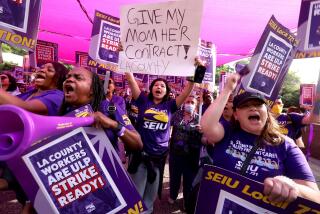SEIU breaks off contract talks with L.A. County
The possibility of a walkout affecting a wide array of public services loomed larger Wednesday after the union representing most Los Angeles County government employees broke off negotiations, charging that county officials have been unresponsive to their demands.
“We, the members, we’re so ready to strike,” said Jessi Gonzalez, a social worker who is bargaining committee member for SEIU 721, which represents 55,000 county workers. “We’re in a situation where we don’t see any respect from Los Angeles County listening to what we are asking in negotiations…. They won’t read our proposals, they show up late to bargaining.”
Labor and county officials say several steps would need to take place before a strike, but if one occurs, residents would see reductions in such services as processing requests for birth certificates and permits, medical care and maintenance of parks and libraries.
County officials say they are offering the SEIU, the largest county employee union, the same 6% raise agreed to by other labor groups, including those that represent deputy sheriffs, firefighters and engineers. Emerging from the recession and facing fiscal uncertainties of the federal healthcare overhaul, the county cannot offer more, Chief Executive Officer William Fujioka said Wednesday in an interview.
“We think this raise — a 6% raise over an 18-month period is ... reasonable and responsible,” he said, adding that he has offered to have labor leaders sit down with county finance officials to examine the books and see there is no hidden pot of money. “The worst thing the county could do, what this county won’t do is act fiscally irresponsible…. We’re not going to put something out that we don’t think we could afford.”
Relations between the county and the union are tense. The last time SEIU held a strike authorization vote, in 2000, workers walked picket lines for 11 days. The action ended when then-Cardinal Roger Mahony intervened and urged both sides to come back to the table.
Relations were generally amicable for several years, with the union forgoing raises to help the county weather the economic downturn. That move allowed the county, unlike the city of Los Angeles, to avoid layoffs, furloughs and major cuts to services.
The SEIU local and the county have been negotiating for months to renew a contract that expired Sept. 30. The next day, county labor leaders walked out and thousands of workers rallied in the streets of downtown Los Angeles. Intense bargaining talks have been held since then, with a total of 400 negotiators broken into teams discussing issues affecting different groups of workers. Between Monday morning the suspension of talks Tuesday night, the teams met in windowless rooms in Pasadena for 21 hours.
A major stumbling block has been county contributions to health premiums, which are set to increase 7.2% to 8.2% on Jan. 1. Even with a 6% pay increase, lower-wage workers will effectively see a reduction in take-home pay because of higher healthcare costs, according to the SEIU.
County officials said they verbally offered to cover the 7.2% increase in health costs if labor leaders would agree to discuss changes to retiree healthcare benefits for future workers.
“To say that we are not offering [to offset medical insurance increases] is not true, not accurate,” Fujioka said. “They know that’s in the budget.”
Lowell Goodman, a spokesman for the SEIU, provided a document outlining the county’s final offer, as of 10:33 a.m. on Tuesday. A section on healthcare costs says, “No increase in employer contribution.”
The union is also seeking reductions in social worker caseloads, property tax changes to close a loophole for corporations, a living-wage increase for contract workers (who are not represented by the SEIU) and an enhanced ride-share program.
Some SEIU members are frustrated by the union’s demands on matters that are unrelated to employee salary and benefits.
“If they want to pursue a political agenda, that’s fine, do it in Sacramento. Don’t do it at the bargaining table,” said Topanga Bird, a shop steward at the county’s child-abuse hotline. “… I am expected to raise my SEIU flag, wave it and lead 200-plus people out of my office on the streets, and people are asking me, ‘for what?’ ”
Gonzalez and other social workers involved in the negotiations said the issue of reducing social worker caseloads was critical, given a series of high-profile deaths of foster children in recent years.
She noted that social workers have caseloads of 38 to 40 children, when their contract calls for 31. Experts have recommended caseloads be held to 15 children to ensure that they are properly served and protected, union officials note.
The county’s Board of Supervisors are a “bunch of hypocrites,” she said. “They fired social workers and made the public think the problem is resolved. I’m sorry, there’s going to be another death next year, and the year after that.”
Fujioka noted that the county is in the process of hiring an additional 250 social workers, and a blue-ribbon committee is studying ways to improve county supervision of foster children.
Balloting on a possible strike was initially supposed to be completed Wednesday, but has been extended into next week because of “overwhelming demand,” Goodman said.
“Our members are deciding what kind of action they want to take to signal to the Board of Supervisors,” he said.
More to Read
Sign up for Essential California
The most important California stories and recommendations in your inbox every morning.
You may occasionally receive promotional content from the Los Angeles Times.











